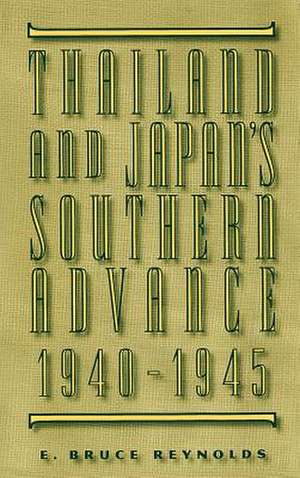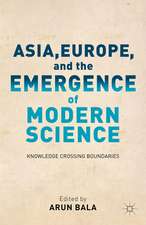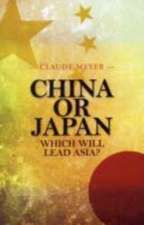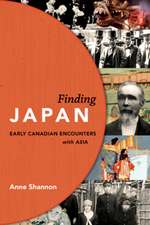Thailand and Japan's Southern Advance, 1940-1945
Autor E. Bruce Reynoldsen Limba Engleză Hardback – 3 mar 1994
Preț: 550.61 lei
Preț vechi: 598.49 lei
-8% Nou
Puncte Express: 826
Preț estimativ în valută:
105.36€ • 110.00$ • 87.20£
105.36€ • 110.00$ • 87.20£
Carte disponibilă
Livrare economică 14-28 martie
Preluare comenzi: 021 569.72.76
Specificații
ISBN-13: 9780312104023
ISBN-10: 0312104022
Pagini: 356
Ilustrații: XVII, 334 p.
Dimensiuni: 152 x 229 x 29 mm
Greutate: 0.76 kg
Ediția:1994
Editura: Palgrave Macmillan US
Colecția Palgrave Macmillan
Locul publicării:New York, United States
ISBN-10: 0312104022
Pagini: 356
Ilustrații: XVII, 334 p.
Dimensiuni: 152 x 229 x 29 mm
Greutate: 0.76 kg
Ediția:1994
Editura: Palgrave Macmillan US
Colecția Palgrave Macmillan
Locul publicării:New York, United States
Descriere
'...a fascinating story and is ably told. One key aspect of the book is that it provides an account of events in Bangkok immediately before the outbreak of war' - Antony Best, London School of Economics;'...This thorough account makes excellent reading for anyone who wants to know what went on away from the the battlefronts of World War II.'- Almanac '...Drawing on contemporary English, Thai and Japanese language accounts, Reynolds compellingly argues that Japanese officers and officials on the spot were well aware of their failure to cultivate more than outward sympathy from the Thai...He offers a fascinating account of how Thailand deftly managed to cultivate the Allies while not alienating Japan by pursuing a multitrack, flexible diplomacy...Fine books such as this should be required reading for aspiring Cabinet members to help ward off the selective amnesia that has caused such great embarrassment to Japan and distress among its neighbours.'- Jeff Kingston, Japan Times '...the collection offers a number of interesting observations on the nature of the Pacific War...The most significant issues that Dockrill addresses is that of how Japan views the war in retrospect, a question which not only tells us a lot about how events were seen in Japan in 1941 but is also...a matter still of importance in contemporary East Asian politics.' Antony Best, Intelligence & National Security The crises that marked the dramatic expansion of Japanese rule over Asia posed unique problems for Thailand. The only independent country in Southeast Asia, Thailand was clearly too weak to withstand Japan, but, as a sovereign state, it had the great advantage that it could not be 'liberated' by the Japanese military in the same manner as the European and American colonies. The abilities that had proven so vital in fending off British and French imperialism were also to be essential in dealing with Japan. This study, based on Japanese, Thai, and English language sources - including the Office of Strategic Services files and MAGIC intercepts - examines the circumstances and strategies that led Thailand into a wartime alliance with Japan, Tokyo's efforts to integrate Thailand into the Greater East Asia Co-Prosperity Sphere, and Thai manoeuvers to resist Japan's embrace. Finally, it explains how, during the latter stages of the war, Thailand was able to maintain relations with Japan while surreptitiously establishing links with the Allies.
Cuprins
Preface - Acknowledgements - Acronyms and Abbreviations Used in the Text and Notes - Japanese-Thai Relations from Ayutthaya to the New Siam - Phibun and the Japanese, 1938-1941 - A War of Nerves - The Moment of Truth - A Squandered Opportunity - Japan's New Deal for Asia - The Downfall of Phibun - The Tense Final Months - Conclusion - Notes - Bibliography - Index
Recenzii
'...a fascinating story and is ably told. One key aspect of the book is that it provides an account of events in Bangkok immediately before the outbreak of war' - Antony Best, London School of Economics;'...This thorough account makes excellent reading for anyone who wants to know what went on away from the the battlefronts of World War II.'- Almanac '...Drawing on contemporary English, Thai and Japanese language accounts, Reynolds compellingly argues that Japanese officers and officials on the spot were well aware of their failure to cultivate more than outward sympathy from the Thai...He offers a fascinating account of how Thailand deftly managed to cultivate the Allies while not alienating Japan by pursuing a multitrack, flexible diplomacy...Fine books such as this should be required reading for aspiring Cabinet members to help ward off the selective amnesia that has caused such great embarrassment to Japan and distress among its neighbours.'- Jeff Kingston, Japan Times '...the collection offers a number of interesting observations on the nature of the Pacific War...The most significant issues that Dockrill addresses is that of how Japan views the war in retrospect, a question which not only tells us a lot about how events were seen in Japan in 1941 but is also...a matter still of importance in contemporary East Asian politics.' Antony Best, Intelligence & National Security











